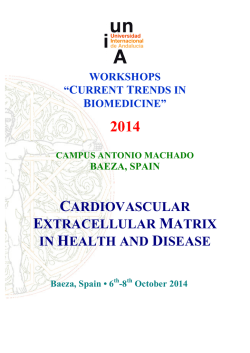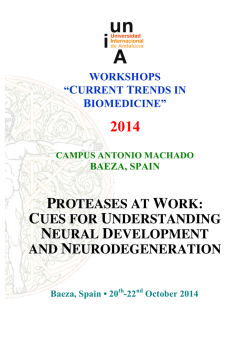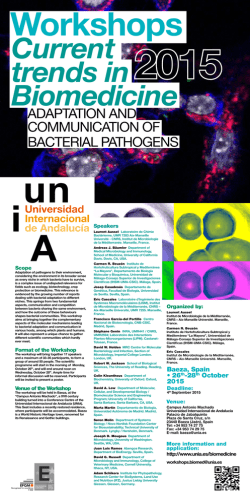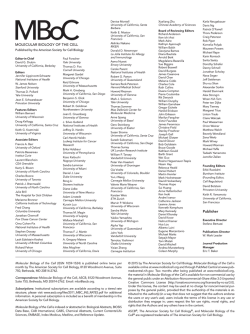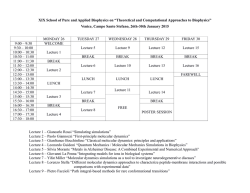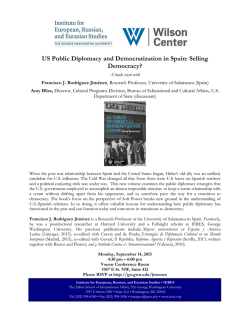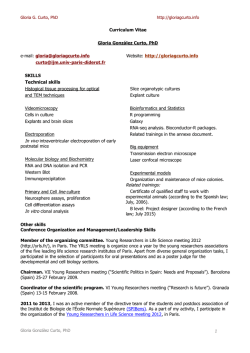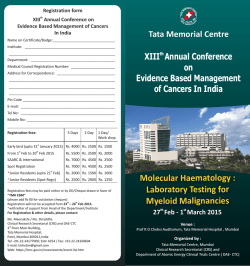
chaperones in the maintenance of cellular proteostasis
WORKSHOPS “CURRENT TRENDS IN BIOMEDICINE” 2016 CAMPUS ANTONIO MACHADO BAEZA, SPAIN CHAPERONES IN THE MAINTENANCE OF CELLULAR PROTEOSTASIS Baeza, Spain • 17th-19th October 2016 Organized by: José María Valpuesta Centro Nacional de Biotecnología (CNB-CSIC). Madrid, Spain. Ana María Cuervo Institute for Aging Studies, Albert Einstein College of Medicine. New York, USA. Cintia Roodveldt CABIMER-Andalusian Center for Molecular Biology and Regenerative Medicine. Sevilla, Spain. Sponsors: The Company of Biologists Limited ( www.biologists.com ) will cover the workshop fees (registration and/or accommodation-meals) of some participants, selected by the organizers after the deadline. SCOPE Molecular chaperones comprise a large group of proteins originally characterized as involved in assisting the folding of many proteins. However, it has become clear that their roles are much more complex and diverse, including disaggregation of aggregated species and targeting for protein degradation, among other activities. Molecular chaperones have been extensively studied at the structural and biochemical levels and their cellular role as main proteostasis regulators is well supported. Growing evidence revealing that alterations in cellular quality control underlie the pathogenic basis for severe common human neurodegenerative disorders such as Alzheimer’s or Parkinson’s diseases, has brought molecular chaperones back to stardom in recent years. In fact, the tight functional interactions between molecular chaperones and the cellular systems involved in protein clearance, such as the ubiquitin-proteasome system and autophagy, have unveiled chaperones as essential components of the cellular and organismal proteostasis networks. These recent links with human diseases have propelled the vertiginous expansion that the field of molecular chaperones has undergone in recent years (> 8000 papers in the last five years). The goal of this meeting is to facilitate the communication among the different fields of research currently interested in the roles of molecular chaperones in cellular proteostasis, as well as to foment an integrated approach to defining the contribution of alterations in this process to pathological conditions and to exploring their value as potential therapeutic targets. FORMAT OF THE WORKSHOP The workshop will bring together a maximum of 17 speakers and 35 participants, to form a group of around 50 people. The scientific programme will start in the morning of Monday, October 17 th, and will end around noon on Wednesday, October 19th. Ample time for informal discussion will be reserved. Participants will be invited to present a poster. VENUE OF THE WORKSHOP The workshop will be held in Baeza, at the “Campus Antonio Machado”, a XVII century building turned into a Conference Centre of the Universidad Internacional de Andalucía (UNIA). This Seat includes a residence, where participants will be accommodated. Baeza is a World Historic Heritage town, renowned for its Renaissance and Gothic buildings. SPEAKERS Johannes Buchner Center for Integrated Protein Science at the Department Chemie, Technische München. Garching, Germany. Bernd Bukau Universität Center for Molecular Biology of the University of Heidelberg (ZMBH) / German Cancer Research Center. Heidelberg, Germany. Ana María Cuervo Department of Developmental and Molecular Biology, Institute for Aging Studies, Albert Einstein College of Medicine. New York, NY, USA. Douglas M. Cyr Department of Cell Biology and Physiology, School of Medicine, University of North Carolina. Chapel Hill, NC, USA. Judith Frydman Department of Biology and Genetics, Stanford University. Stanford, CA, USA. Carmen Garrido INSERM, UMR 866, Université de Bourgogne, Anticancer Center Georges François Leclerc. Dijon, France. Jason E. Gestwicki Department of Pharmaceutical Chemistry, University of California at San Francisco. San Francisco, CA, USA. Lila M. Gierasch Department of Biochemistry and Molecular Biology and Department of Chemistry, University of Massachusetts. Amherst, MA, USA. F. Ulrich Hartl Department of Cellular Biochemistry, Max Planck Institute of Biochemistry. Martinsried, Germany. Jörg Höhfeld Institute for Cell Biology, Rheinische FriedrichWilhelms-University Bonn. Bonn, Germany. Harm H. Kampinga University Medical Center Groningen, University of Groningen, Department of Cell Biology. Groningen, The Netherlands. Guillermo Montoya Macromolecular Crystallography Group, Novo Nordisk Foundation Center for Protein Research, Faculty of Health and Medical Sciences, University of Copenhagen. Copenhagen, Denmark. Arturo Muga Unidad de Biofísica (CSIC-UPV/EHU) y Departamento de Bioquímica y Biología Molecular, Facultad de Ciencia y Tecnología, Universidad del País Vasco (UPV/EHU). Bilbao, Spain. Cintia Roodveldt CABIMER-Andalusian Center for Molecular Biology and Regenerative Medicine. Sevilla, Spain. Laura Santambrogio Department of Pathology / Department of Microbiology and Immunology, Albert Einstein College of Medicine. New York, NY, USA. José María Valpuesta Department of Macromolecular Structure, Centro Nacional de Biotecnología (CNB-CSIC). Madrid, Spain. Juan Carlos Zabala Departamento de Biología Molecular, Facultad de Medicina, IDIVAL-Universidad de Cantabria. Santander, Spain. DEADLINE: 2nd SEPTEMBER 2016 MORE INFORMATION AND APPLICATION: http://www.unia.es/biomedicine [email protected] Universidad Internacional de Andalucía Campus Antonio Machado Palacio de Jabalquinto Plaza de Santa Cruz, s/n. 23440 Baeza (Jaén), Spain Tel: +34 953 74 27 75. Fax: +34 953 74 29 75. E-mail: [email protected]
© Copyright 2026
